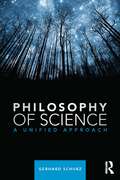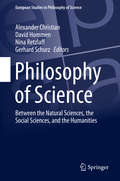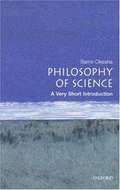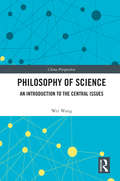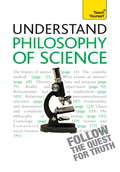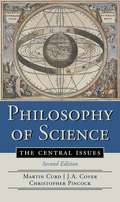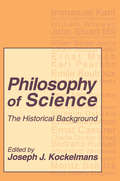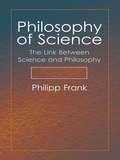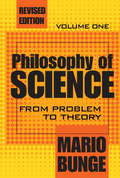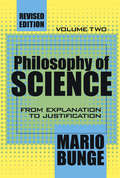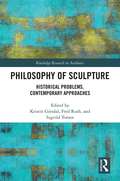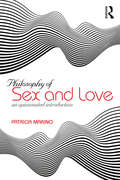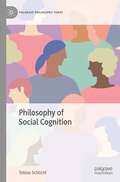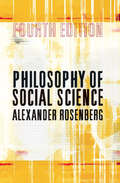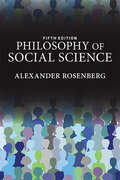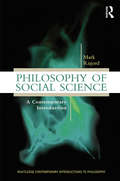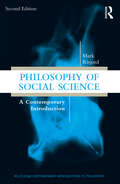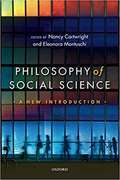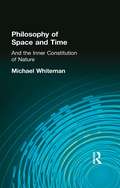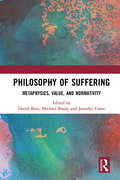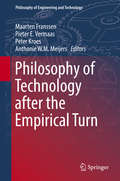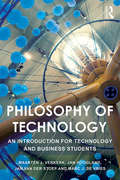- Table View
- List View
Philosophy of Science: A Unified Approach
by Gerhard SchurzPhilosophy of Science: A Unified Approach combines a general introduction to philosophy of science with an integrated survey of all its important subfields. As the book’s subtitle suggests, this excellent overview is guided methodologically by "a unified approach" to philosophy of science: behind the diversity of scientific fields one can recognize a methodological unity of the sciences. This unity is worked out in this book, revealing all the while important differences between subject areas. Structurally, this comprehensive book offers a two-part approach, which makes it an excellent introduction for students new to the field and a useful resource for more advanced students. Each chapter is divided into two sections. The first section assumes no foreknowledge of the subject introduced, and the second section builds upon the first by bringing into the conversation more advanced, complementary topics. Definitions, key propositions, examples and figures overview all of the core material. At the end of every chapter there are selected readings and exercises (with solutions at the end of the book). The book also includes a comprehensive bibliography and an index.
Philosophy of Science: A Unified Approach (European Studies In Philosophy Of Science Ser. #9)
by Gerhard Schurz Alexander Christian David Hommen Nina RetzlaffThis broad and insightful book presents current scholarship in important subfields of philosophy of science and addresses an interdisciplinary and multidisciplinary readership. It groups carefully selected contributions into the four fields of I) philosophy of physics, II) philosophy of life sciences, III) philosophy of social sciences and values in science, and IV) philosophy of mathematics and formal modeling. Readers will discover research papers by Paul Hoyningen-Huene, Keizo Matsubara, Kian Salimkhani, Andrea Reichenberger, Anne Sophie Meincke, Javier Suárez, Roger Deulofeu, Ludger Jansen, Peter Hucklenbroich, Martin Carrier, Elizaveta Kostrova, Lara Huber, Jens Harbecke, Antonio Piccolomini d’Aragona and Axel Gelfert. This collection fosters dialogue between philosophers of science working in different subfields, and brings readers the finest and latest work across the breadth of the field, illustrating that contemporary philosophy of science has successfully broadened its scope of reflection. It will interest and inspire a wide audience of philosophers as well as scholars of the natural sciences, social sciences and the humanities. The volume shares selected contributions from the prestigious second triennial conference of the German Society for Philosophy of Science/ Gesellschaft für Wissenschaftsphilosophie (GWP.2016, March 8, 2016 – March 11, 2016).
Philosophy of Science: A Very Short Introduction
by Samir OkashaWhat is science? Is there a real difference between science and myth? Is science objective? Can science explain everything? This Very Short Introduction provides a concise overview of the main themes of contemporary philosophy of science. Beginning with a short history of science to set the scene, Samir Okasha goes on to investigate the nature of scientific reasoning, scientific explanation, revolutions in science, and theories such as realism and anti-realism. He also looks at philosophical issues in particular sciences, including the problem of classification in biology, and the nature of space and time in physics. The final chapter touches on the conflicts between science and religion, and explores whether science is ultimately a good thing.
Philosophy of Science: An Introduction to the Central Issues (China Perspectives)
by Wang WeiThe book is a translation of the second edition of a much-used and research-based Chinese textbook. As a succinct and issue-based introduction to the Western philosophy of science, the book brings eight focal issues in the field to the fore and augments each topic by incorporating Chinese perspectives. Followed by an overview of the historical framework and logical underpinnings of the philosophy of science, the book thoroughly discusses eight issues in the discipline: (1) the criteria of cognitive meaning, (2) induction and confirmation, (3) scientific explanation, (4) theories of scientific growth, (5) the demarcation between science and pseudoscience, (6) scientific realism and empiricism; (7) the philosophy of scientific experimentation, (8) science and value. Not confined to Western mainstream discourse in this field, the book also introduces voices of Chinese philosophers of note and adopts a stance that productively combines logical empiricism and Kuhnianism, both of which tend to be covered in less detail by many English language textbooks. In the final chapter the author offers a prognosis regarding the future of the discipline based on recent trends.This book will be of value to students who study philosophy of science and hope to gain a better understanding of science and technology.
Philosophy of Science: Teach Yourself
by Mel ThompsonA modern understanding of the world is unthinkable without science, but what exactly is it? What does it mean to say that something is 'scientific'? How are its results justified? From the genetic basis of life, to the structures of the universe and the atom, TEACH YOURSELF PHILOSOPHY OF SCIENCE explores how the key ideas that shape our world have been developed.- Investigate the history of science.- Examine scientific method.- Discover key philosophers and scientists.- Explore the impact of science on Western thought.
Philosophy of Science: Teach Yourself
by Mel ThompsonA modern understanding of the world is unthinkable without science, but what exactly is it? What does it mean to say that something is 'scientific'? How are its results justified? From the genetic basis of life, to the structures of the universe and the atom, TEACH YOURSELF PHILOSOPHY OF SCIENCE explores how the key ideas that shape our world have been developed.- Investigate the history of science.- Examine scientific method.- Discover key philosophers and scientists.- Explore the impact of science on Western thought.
Philosophy of Science: The Central Issues
by Christopher Pincock Martin Curd J. A. CoverBoth an anthology and an introductory textbook, Philosophy of Science: The Central Issues offers instructors and students a comprehensive anthology of fifty-two primary texts by leading philosophers in the field and provides extensive editorial commentary that places the readings in a wide philosophical context.
Philosophy of Science: The Historical Background
by Joseph J. KockelmansThis anthology of selections from the works of noted philosophers affords the student an immediate contact with the unique historical background of the philosophy of science. The selections, many of which have not been readily accessible, follow the development of the philosophy of science from 1786 to 1927. Each selection is preceded by a brief introduction by the editor designed to familiarize the reader with a particular philosopher and provide insights into his work.Joseph J. Kockelmans divides the selections into several sections. Part 1, from 17861850, includes chapters by Immanuel Kant, on the metaphysical foundations of natural science, John Frederick William Herschel, on experience and the analysis of phenomena, William Whewell, on the nature and conditions of inductive science, and John Stuart Mill, on induction and the law of universal causation; part 2, from 18701899, includes chapters by Hermann Von Helmholtz, on the origin and significance of geometrical axioms, William Stanley Jevons, on the philosophy of inductive inference, John Bernard Stallo, on the kinetic theory of gasses and the conditions of the validity of scientific hypotheses, Ernst Mach, on the economical nature of physical inquiry, Karl Pearson, on perceptual and conceptual space, Emile Boutroux, on mechanical laws, Heinrich Hertz, on the appropriateness, correctness, and permissibility of scientific theories, and Ludwig Boltzmann, on the fundamental principles and basic equations of mechanics.The third part, covering the first decade of the twentieth century, includes chapters by Henri Jules Poincare, on science and reality, Charles Peirce, on Induction, Pierre Marie Duhem, on the laws of physics, William Ostwald, on energetism and mechanics, Emile Meyerson, on identity of thought and nature as the final goal of science, Ernst Cassirer, on functional concepts of natural science; part 4, from 19101927, includes chapters by Charles Dunbar Broad, on phenomenalism, Alfred North Whitehead, on time, space, and material, Bertrand Russell, on the world of physics and the world of sense, Norman Robert Cambbell, on the meaning of science, Moritz Schlick, on basic issues of the philosophy of natural science, and Percy Williams Bridgman, on the concepts of space, time, and causality.Philosophy of Science provides a concise single volume text to the discipline and enables students to understand and evaluate the various trends in our contemporary philosophy of science.Joseph J. Kockelmans is professor emeritus of philosophy at the Pennsylvania State Univers
Philosophy of Science: The Link Between Science and Philosophy
by Philipp FrankA great mathematician and teacher bridges the gap between science and the humanities in this exposition of the philosophy of science. Philipp Frank, a distinguished physicist and philosopher in his own right, traces the history of science from Aristotle to Einstein to illustrate philosophy’s ongoing role in the scientific process.Suitable for undergraduate students and other readers, this volume explains modern technology’s role in the gradual erosion of the rapport between physical theories and philosophical systems, and offers suggestions for restoring the link between these related areas. Dr. Frank examines the ancient Greek concept of natural science to illustrate the development of modern science; then, using geometry as an example, he charts its progress from Euclidean principles through the interpretations of Descartes, Mill, Kant, and the rise of four-dimensional and non-Euclidean geometry. Additional topics include the laws of motion, before and after innovations of Galileo and Newton; perceptions of motion, light, and relativity through the ages; metaphysical interpretations of relativistic physics; the motion of atomic objects and the phenomena and formulations of atomic physics; and the principle of causality and the validation of theories.
Philosophy of Science: Volume 1, From Problem to Theory
by Mario BungeOriginally published as Scientific Research, this pair of volumes constitutes a fundamental treatise on the strategy of science. Mario Bunge, one of the major figures of the century in the development of a scientific epistemology, describes and analyzes scientific philosophy, as well as discloses its philosophical presuppositions. This work may be used as a map to identify the various stages in the road to scientific knowledge.Philosophy of Science is divided into two volumes, each with two parts. Part 1 offers a preview of the scheme of science and the logical and semantical took that will be used throughout the work. The account of scientific research begins with part 2, where Bunge discusses formulating the problem to be solved, hypothesis, scientific law, and theory.The second volume opens with part 3, which deals with the application of theories to explanation, prediction, and action. This section is graced by an outstanding discussion of the philosophy of technology. Part 4 begins with measurement and experiment. It then examines risks in jumping to conclusions from data to hypotheses as well as the converse procedure.Bunge begins this mammoth work with a section entitled "How to Use This Book." He writes that it is intended for both independent reading and reference as well as for use in courses on scientific method and the philosophy of science. It suits a variety of purposes from introductory to advanced levels. Philosophy of Science is a versatile, informative, and useful text that will benefit professors, researchers, and students in a variety of disciplines, ranging from the behavioral and biological sciences to the physical sciences.
Philosophy of Science: Volume 2, From Explanation to Justification
by Mario BungeOriginally published as Scientific Research, this pair of volumes constitutes a fundamental treatise on the strategy of science. Mario Bunge, one of the major figures of the century in the development of a scientific epistemology, describes and analyzes scientific philosophy, as well as discloses its philosophical presuppositions. This work may be used as a map to identify the various stages in the road to scientific knowledge.Philosophy of Science is divided into two volumes, each with two parts. Part 1 offers a preview of the scheme of science and the logical and semantical took that will be used throughout the work. The account of scientific research begins with part 2, where Bunge discusses formulating the problem to be solved, hypothesis, scientific law, and theory.The second volume opens with part 3, which deals with the application of theories to explanation, prediction, and action. This section is graced by an outstanding discussion of the philosophy of technology. Part 4 begins with measurement and experiment. It then examines risks in jumping to conclusions from data to hypotheses as well as the converse procedure.Bunge begins this mammoth work with a section entitled ""How to Use This Book."" He writes that it is intended for both independent reading and reference as well as for use in courses on scientific method and the philosophy of science. It suits a variety of purposes from introductory to advanced levels. Philosophy of Science is a versatile, informative, and useful text that will benefit professors, researchers, and students in a variety of disciplines, ranging from the behavioral and biological sciences to the physical sciences.
Philosophy of Sculpture: Historical Problems, Contemporary Approaches (Routledge Research in Aesthetics)
by Kristin GjesdalSculpture has been a central aspect of almost every art culture, contemporary or historical. This volume comprises thirteen essays at the cutting edge of thinking about sculpture in philosophical terms, representing approaches to sculpture from the perspectives of both Anglo-American and European philosophy. Some of the essays are historically situated, while others are more straightforwardly conceptual. All of the essays, however, pay strict attention to actual sculptural examples in their discussions. This reflects the overall aim of the volume to not merely "apply" philosophy to sculpture, but rather to test the philosophical approaches taken in tandem with deep analyses of sculptural examples. There is an array of philosophical problems unique to sculpture, namely certain aspects of its three-dimensionality, physicality, temporality, and morality. The authors in this volume respond to a number of challenging philosophical questions related to these characteristics. Furthermore, while the focus of most of the essays is on Western sculptural traditions, there are contributions that features discussion of sculptural examples from non-Western and archaic sources. Philosophy of Sculpture is the first full-length book treatment of the philosophical significance of sculpture in English. It is a valuable resource for advanced students and scholars across aesthetics, art history, history, performance studies, and visual studies.
Philosophy of Sex and Love: An Opinionated Introduction
by Patricia MarinoWriting for non-specialists and students as well as for fellow philosophers, this book explores some basic issues surrounding sex and love in today's world, among them consent, objectification, non-monogamy, racial stereotyping, and the need to reconcile contemporary expectations about gender equality with our beliefs about how love works. Author Patricia Marino argues that we cannot fully understand these issues by focusing only on individual desires and choices. Instead, we need to examine the social contexts within which choices are made and acquire their meanings. That perspective, she argues, is especially needed today, when the values of individualism, self-expression, and self-interest permeate our lives. Marino asks how we can fit these values, which govern so many areas of contemporary life, with the generosity, caring, and selflessness we expect in love and sex. Key Features of Philosophy of Sex and Love: An Opinionated Introduction Offers a contemporary, problems-based approach to the subject, helping readers better understand and address current issues and controversial questions Includes coverage of sex and love as they intersect with topics like disability, race, medicine, and economics Considers not only the ethical, but also the broadly social and political dimensions of sex and love Includes a helpful introduction and conclusion in each chapter and is written throughout in a clear and straightforward style, with examples and signposts to help guide the student and general reader A comprehensive and up-to-date bibliography provides a valuable tool for anyone’s further research
Philosophy of Social Cognition (Palgrave Philosophy Today)
by Tobias SchlichtThis introductory textbook provides a comprehensive and up-to-date overview of the main issues in contemporary philosophy of social cognition. It explains and critically discusses each of the key philosophical answers to the captivating question of how we understand the mental life of other sentient creatures. Key Features:· Clearly and fully describes the major theoretical approaches to the understanding of other people’s minds.· Suggests the major advantages and limitations of each approach, indicating how they differ as well as the ideas they have in common. · Tests each philosophical theory against the best available empirical data from psychology, neuroscience and psychopathology.· Includes suggestions for additional reading and practice study questions at the end of each chapter. Philosophy of Social Cognition is essential reading for all undergraduate and graduate students taking introductory courses on social cognition. It is also ideal for courses on cognitive neuroscience, social psychology and sociological theory.
Philosophy of Social Science
by Alexander RosenbergRosenberg (philosophy, Duke U. ) introduces students to the philosophical foundations of the human sciences, including economics, anthropology, sociology, political science, psychology, history, and fields at the intersections of these subjects with biology. He discusses the relevance of philosophy, then the problems raised by alternative explanatory strategies, including behaviorism, structuralism, and interpretational theories like critical theory, as well as the relationship between social sciences and moral philosophy. Reorganized into 15 chapters, this edition has new chapters on philosophical anthropology, functionalism as a research program, and theories of cultural evolution; more on the role of norms and speech acts in social construction, including the work of John Searle; more on interpretive social science and continental philosophers with an expanded discussion of the critical theories of those such as Habermas, Foucault, and Bourdieu; new discussion of the role of models and equilibrium explanations in economics and the problem of spontaneous order in the creation of institutions; more on invisible hand explanations and rational choice theory in economics and political science; and an overview of Sen's capacities alternative to utilitarianism and Rawls' and other theories of development. Annotation ©2012 Book News, Inc. , Portland, OR (booknews. com)
Philosophy of Social Science
by Alexander RosenbergPhilosophy of Social Science provides a tightly argued yet accessible introduction to the philosophical foundations of the human sciences, including economics, anthropology, sociology, political science, psychology, history, and the disciplines emerging at the intersections of these subjects with biology. Philosophy is unavoidable for social scientists because the choices they make in answering questions in their disciplines force them to take sides on philosophical matters. Conversely, the social and behavior sciences must inform philosophers' understanding of human action, norms, and social institutions. The fourth edition retains an illuminating interpretation of the enduring relations between the social sciences and philosophy, and it has now been thoroughly revised to better fit courses, including fifteen chapters, with more effective transitions and helpful summaries. This edition also includes three new chapters on philosophical anthropology, functionalism as a research program, and theories of cultural evolution, as well as enhanced discussions of the role of norms and speech acts in social construction in interpretive social science and a chapter on continental philosophers of social science.
Philosophy of Social Science
by Alexander RosenbergPhilosophy of Social Science provides a tightly argued yet accessible introduction to the philosophical foundations of the human sciences, including economics, anthropology, sociology, political science, psychology, history, and the disciplines emerging at the intersections of these subjects with biology. Philosophy is unavoidable for social scientists because the choices they make in answering questions in their disciplines force them to take sides on philosophical matters. Conversely, the social and behavior sciences must inform philosophers’ understanding of human action, norms, and social institutions. The fourth edition retains an illuminating interpretation of the enduring relations between the social sciences and philosophy, and it has now been thoroughly revised to better fit courses, including fifteen chapters, with more effective transitions and helpful summaries. This edition also includes three new chapters on philosophical anthropology, functionalism as a research program, and theories of cultural evolution, as well as enhanced discussions of the role of norms and speech acts in social construction in interpretive social science and a chapter on continental philosophers of social science.
Philosophy of Social Science, Fifth Edition
by Alexander RosenbergPhilosophy of Social Science provides a tightly argued yet accessible introduction to the philosophical foundations of the human sciences, including economics, anthropology, sociology, political science, psychology, history, and the disciplines emerging at the intersections of these subjects with biology. Philosophy is unavoidable for social scientists because the choices they make in answering questions in their disciplines force them to take sides on philosophical matters. Conversely, the philosophy of social science is equally necessary for philosophers since the social and behavior sciences must inform their understanding of human action, norms, and social institutions. The fifth edition retains from previous editions an illuminating interpretation of the enduring relations between the social sciences and philosophy, and reflects on developments in social research over the past two decades that have informed and renewed debate in the philosophy of social science. An expanded discussion of philosophical anthropology and modern and postmodern critical theory is new for this edition.
Philosophy of Social Science: A Contemporary Introduction (Routledge Contemporary Introductions to Philosophy)
by Mark RisjordThe Philosophy of Social Science: A Contemporary Introduction examines the perennial questions of philosophy by engaging with the empirical study of society. The book offers a comprehensive overview of debates in the field, with special attention to questions arising from new research programs in the social sciences. The text uses detailed examples of social scientific research to motivate and illustrate the philosophical discussion. Topics include the relationship of social policy to social science, interpretive research, action explanation, game theory, social scientific accounts of norms, joint intentionality, reductionism, causal modeling, case study research, and experimentation.
Philosophy of Social Science: A Contemporary Introduction (Routledge Contemporary Introductions to Philosophy)
by Mark RisjordPhilosophy of Social Science: A Contemporary Introduction examines perennial questions of philosophy through engaging the empirical study of society. Questions of normativity concern the place of values in social scientific inquiry. Questions of naturalism concern the relationship between the natural and the social sciences. And questions of reductionism ask how social institutions relate to the people who constitute them. This accessible text offers a comprehensive overview of debates in the field, with special attention to new research programs. Topics include the relationship of social policy to social science, interpretive research, cognitive and evolutionary explanations, intentional action explanation, rational choice theory, conventions and social norms, joint intentionality, causal inference, and experimentation. Detailed examples of social scientific research motivate the philosophical questions and illustrate the important concepts. Treating philosophical commitments as implicit in social science, students of the social sciences will benefit from its application of philosophical argument to methodological and theoretical problems. The text argues that social science transforms philosophical questions, and students of philosophy will benefit from its direct engagement with contemporary debates. The Second Edition provides updates with the most recent literature and adds two new chapters: one on modeling and one on the role of race and gender in the social sciences. Key Updates to the Second Edition: A new chapter on "Modeling and Explaining," which explores how models represent social systems and whether highly idealized models explain A new chapter on "Race and Other Social Constructions," capturing much of the recent empirical research and philosophical interest in the social construction of categories like race and gender Revised and updated chapters throughout, clarifying earlier presentations and bringing discussions from the First Edition into line with new research Updated annotated Further Reading lists, which now include relevant publications from 2013 to 2022.
Philosophy of Social Science: A New Introduction
by Nancy Cartwright Eleanora MontuschiThis is a much-needed new introduction to a field that has been transformed in recent years by exciting new subjects, ideas, and methods. It is designed both for students with central interests in philosophy and those planning to concentrate on the social sciences, and it presupposes no particular background in either domain. From the wide range of topics at the forefront of debate in philosophy of social science, the editors have chosen those which are representative of the most important and interesting contemporary work. A team of distinguished experts explore key aspects of the field such as social ontology (what are the things that social science studies?), objectivity, formal methods, measurement, and causal inference. Also included are chapters focused on notable subjects of social science research, such as well-being and climate change. Philosophy of Social Science provides a clear, accessible, and up-to-date guide to this fascinating field.
Philosophy of Space and Time: And the Inner Constitution of Nature
by Michael WhitemanThis is Volume XVII of seventeen in a series on Metaphysics. Originally published in 1967, this is a phenomenological study into the philosophy of space and time and the inner constitution of nature and the theory of everything being 'simply located'.
Philosophy of Suffering: Metaphysics, Value, and Normativity
by Michael Brady Jennifer Corns David BainSuffering is a central component of our lives. We suffer pain. We fall ill. We fail and are failed. Our loved ones die. It is a commonplace to think that suffering is, always and everywhere, bad. But might suffering also be good? If so, in what ways might suffering have positive, as well as negative, value? This important volume examines these questions and is the first comprehensive examination of suffering from a philosophical perspective. An outstanding roster of international contributors explore the nature of suffering, pain, and valence, as well as the value of suffering and the relationships between suffering, morality, and rationality. Philosophy of Suffering: Metaphysics, Value, and Normativity is essential reading for students and researchers in philosophy of mind, philosophy of psychology, cognitive and behavioral psychology as well as those in health and medicine researching conceptual issues regarding suffering and pain.
Philosophy of Technology after the Empirical Turn
by Maarten Franssen Peter Kroes Pieter E. E. Vermaas Anthonie W.M. W. M. MeijersThis volume features 16 essays on the philosophy of technology that discuss its identity, its position in philosophy in general, and the role of empirical studies in philosophical analyses of engineering ethics and engineering practices. This volume is published about fifteen years after Peter Kroes and Anthonie Meijers published a collection of papers under the title The empirical turn in the philosophy of technology, in which they called for a reorientation toward the practice of engineering, and sketched the likely benefits for philosophy of technology of pursuing its major questions in an empirically informed way. The essays in this volume fall apart in two different kinds. One kind follows up on The empirical turn discussion about what the philosophy of technology is all about. It continues the search for the identity of the philosophy of technology by asking what comes after the empirical turn. The other kind of essays follows the call for an empirical turn in the philosophy of technology by showing how it may be realized with regard to particular topics. Together these essays offer the reader an overview of the state of the art of an empirically informed philosophy of technology and of various views on the empirical turn as a stepping stone into the future of the philosophy of technology.
Philosophy of Technology: An Introduction for Technology and Business Students (Philosophy Of Engineering And Technology Ser. #9)
by Jan Hoogland Maarten J Verkerk Jan van der Stoep Marc J. de VriesPhilosophy of Technology: An introduction for technology and business students is an accessible guide to technology’s changes , their ubiquitousness, and the many questions these raise. Designed for those with no philosophical background in mind, it is ideal for technology and engineering students or specialists who want to learn to think critically about how their work influences society and our daily lives. The technological, business environment and daily experiences are the starting point of the book and the authors’ reflect upon these practices from a philosophical point of view. The text goes on to present a critical analysis of the subject including development, manufacturing, sales and marketing and the use of technological products and services. The abstract ideas are made easier to grasp with a story-telling approach: a vivid history of the discipline and colourful portraits of the core thinkers in this domain, as well as four case studies drawing from various engineering disciplines to demonstrate how philosophy can and should influence technology in practice. The first comprehensive introduction to this vibrant young sub-discipline in over 20 years, this is an ideal textbook for students of technology and engineering beginning a course or project in the philosophy of their subject.
